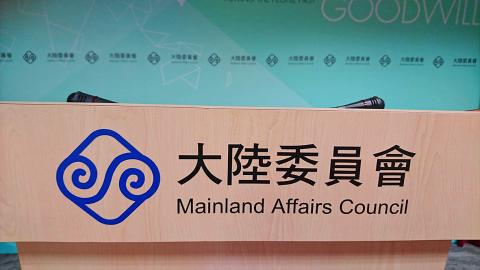Information warfare by the Chinese Communist Party (CCP) does not stop at the Internet, but also targets people-to-people connections, the Mainland Affairs Council’s (MAC) advisory committee said in a summary of committee proceedings released on Friday.
China uses traditional intelligence gathering, as well as cyberwarfare and cognitive warfare tactics, the summary quoted a committee member as saying.
Most noteworthy is the cognitive aspect, as it could affect actual people-to-people connections, the summary said.

Photo: Chung Li-hua, Taipei Times
Teaching people to tell actual news apart from fake news is one solution, it said, adding that other options include legal methods — such as issuing heavier fines — or forming local organizations to counter such actions.
The summary quoted committee members as saying that China’s attempts to influence and affect Taiwanese academia and education have been “exquisite.”
China handles all expenses when inviting Taiwanese academics to visit and takes them on tours, the summary said, adding that these acts subtly influence Taiwanese academics’ perception of China.
In other cases, Chinese students in Taiwan have been tasked with gathering information, and subtly influencing the thought and speech of their Taiwanese classmates and lecturers, the summary said.
The government should step up collaboration with Facebook, Twitter and other major social networking sites, and gather information about the actions of Chinese cyberactivists and their cohorts to prevent further cyberattacks, it said.
The government should compile a database of previous incidents for people to reference online, so they can learn to tell actual information apart from fake news, it added.
The Taiwanese intelligence community and other public departments should also have effective countermeasures against cyberattacks, the summary said, adding that the government could consider establishing a warning system akin to the earthquake warning system.
Taiwan must implement measures that limit or control acts that, while not strictly illegal, nonetheless serve to influence others, it said.
The public cannot simply let foreign attacks slide and should consider where to draw the line to protect the nation’s democratic system, the committee added.

CHAOS: Iranians took to the streets playing celebratory music after reports of Khamenei’s death on Saturday, while mourners also gathered in Tehran yesterday Iranian Supreme Leader Ayatollah Ali Khamenei was killed in a major attack on Iran launched by Israel and the US, throwing the future of the Islamic republic into doubt and raising the risk of regional instability. Iranian state television and the state-run IRNA news agency announced the 86-year-old’s death early yesterday. US President Donald Trump said it gave Iranians their “greatest chance” to “take back” their country. The announcements came after a joint US and Israeli aerial bombardment that targeted Iranian military and governmental sites. Trump said the “heavy and pinpoint bombing” would continue through the week or as long

TRUST: The KMT said it respected the US’ timing and considerations, and hoped it would continue to honor its commitments to helping Taiwan bolster its defenses and deterrence US President Donald Trump is delaying a multibillion-dollar arms sale to Taiwan to ensure his visit to Beijing is successful, a New York Times report said. The weapons sales package has stalled in the US Department of State, the report said, citing US officials it did not identify. The White House has told agencies not to push forward ahead of Trump’s meeting with Chinese President Xi Jinping (習近平), it said. The two last month held a phone call to discuss trade and geopolitical flashpoints ahead of the summit. Xi raised the Taiwan issue and urged the US to handle arms sales to

State-run CPC Corp, Taiwan (CPC, 台灣中油) yesterday said that it had confirmed on Saturday night with its liquefied natural gas (LNG) and crude oil suppliers that shipments are proceeding as scheduled and that domestic supplies remain unaffected. The CPC yesterday announced the gasoline and diesel prices will rise by NT$0.2 and NT$0.4 per liter, respectively, starting Monday, citing Middle East tensions and blizzards in the eastern United States. CPC also iterated it has been reducing the proportion of crude oil imports from the Middle East and diversifying its supply sources in the past few years in response to geopolitical risks, expanding

Pro-democracy media tycoon Jimmy Lai’s (黎智英) fraud conviction and prison sentence were yesterday overturned by a Hong Kong court, in a surprise legal decision that comes soon after Lai was jailed for 20 years on a separate national security charge. Judges Jeremy Poon (潘兆初), Anthea Pang (彭寶琴) and Derek Pang (彭偉昌) said in the judgement that they allowed the appeal from Lai, and another defendant in the case, to proceed, as a lower court judge had “erred.” “The Court of Appeal gave them leave to appeal against their conviction, allowed their appeals, quashed the convictions and set aside the sentences,” the judges